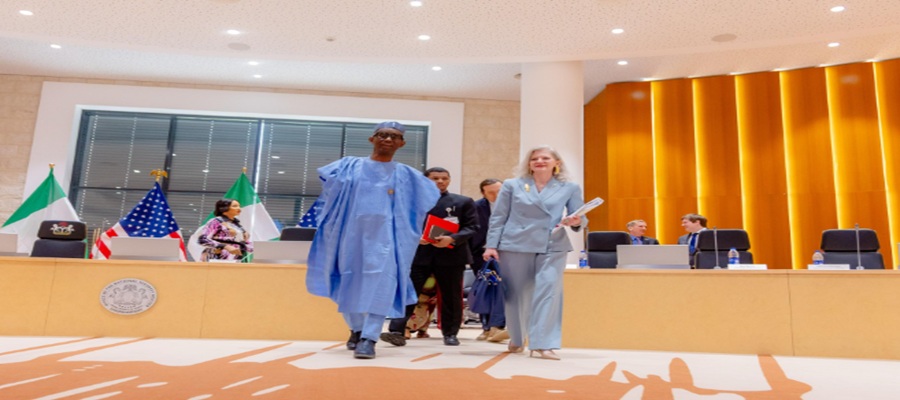General News
CRD Revokes 14 Licenses, Raids Illegal Operators

Courier Regulatory Department (CRD), the regulatory arm of Nigeria Postal Service (NIPOST) has invalidated the operating licenses of Kwara State Transport Corporation, Aero Contractors and 12 others for failing to meet its regulatory standards.
CRD also raided the premises of six unregistered operators, accused of operating without licenses.
Dr. Simon Emeje, senior postmaster general of the federation and head of CRD, said that unregistered operators activities cannot be monitored and accused them of engaging in sharp practices, fraud and diversion of items.
Other operators whose licenses were revoked apart from Kwara State Transport Corporation, Aero Contractors are: Abia Line Courier, Akro Express, AMD (PDC) Nigeria Limited, Arrowhead Courier Limited, Askol Nigeria Limited, Base Aviation Systems Limited, and Ben Courier.
CRD’s hammer also fell on Best Courier Limited, Beta Courier Services Limited, Bruno Courier Services (Nigeria) Limited, Cenok Express and Global Express.
Also, the CRD raided premises of four unregistered courier operators in Illorin, Kwara State and two in Lagos.
The affected operators include, Ajase-Ipo Road, Offa Garage; Young Legacy Line, besides Femi Hospital, Unity road; Watmus Transport Services-Ajase-Ipo Road, offa Garage and Kasmag Line, 9 by 37 Unity Road, all based in Illorin, Kwara State, while Shippyme based at 13 Hughes road, Alagomeji, Yaba and DealDey, an e-commerce platform with warehouse at 17 Awolowo Road, Ikoyi, both in Lagos, were also raided and sealed.
On the revocation of licences of 14 courier firms, Emeje, said: “The reason we are doing this revocation is that they have lost touch with our regulations. Many of them have not shown face in the last three to four years. If some of them are operating behind, they will definitely not be operating well.
“We have considered them a thing of risk for the public to continue doing business with them. Anybody who has lost touch with what is going on-in terms of regulations and standards, will of course not offer good services to the public. We do not want people run into them, patronizing them and complain of losses.
According to Emeje, the industry’s assets are worth over N300 billion annually, but mainly fall, however, the activities of illegal operators, lack of adequate laws (in the absent of an independent regulator), unprofessionalism, among others, have caused several losses in the industry.
Against the backdrop, “It is unfortunate that only 20% of the industry’s potentials are tapped. We are delisting these operators to clear doubts that might be on the minds of both international and local investors, because when the integrity is there, they can be sure of recouping their investment. We will not allow the bad eggs to take over the industry. It remains a continuous exercise”.
Commenting on the raided unregistered operators, Emeje said, “We want to use this medium to announce a development. We have found in the industry that many corporate bodies have bought motorbikes, delivery items/parcels to their customers or clients as the case maybe without courier licences.
“And we all are aware that courier service is a timely, sensitive, a door-to-door service. By our law and regulations, no corporate body is expected to undertake a delivery of any item for a fee or commission. Any company that does that is doing it illegally”.
He cautioned that any company that wants to continue in such delivery should either come and obtain licence from the CRD of NIPOST or contract the service to registered courier firms.
General News
Nigeria Treats Religious Violence as Attack on State – NSA Ribadu

National Security Adviser Nuhu Ribadu has said the federal government considers religious violence an attack on the Nigerian state, stressing that the protection of all citizens, regardless of faith, is non-negotiable.

According to presidential spokesperson Bayo Onanuga, Ribadu made the remarks in Abuja at the close of a US–Nigeria Joint Working Group session.
“Nigeria is a deeply plural society, and the protection of all citizens, Christians, Muslims, and those of other beliefs, is non-negotiable,” Ribadu said.
“Violence framed along religious lines is treated as an attack on the Nigerian state itself.”
In a follow-up post on X, Ribadu said the joint working group has recorded “tangible operational gains” in the fight against terrorism.
The working group was set up following Nigeria’s designation as a Country of Particular Concern (CPC) by US President Donald Trump, a label that often triggers policy actions aimed at ending severe violations of religious freedom.
At the meeting, Ribadu led Nigeria’s delegation, which included representatives from 10 ministries and agencies, while the US delegation, made up of eight federal agencies, was led by Allison Hooker, US under-secretary of state.
Ribadu said Nigeria-US security cooperation has moved from dialogue to action, resulting in the disruption of terrorist networks and transnational criminal groups. He also praised the US for supplying drones, helicopters, platforms, spare parts, and other support systems over the past five years.
Speaking at the session, Hooker said the US was committed to expanding its partnership with Nigeria, particularly on deterring violence against Christian communities.
“Today, we are here to discuss how we can work together to deter violence against Christian communities, prioritising counter-terrorism, insecurity, investigation of attacks, and holding perpetrators accountable,” she said.
She added that efforts would focus on reducing killings, forced displacement, and abductions of Christians, especially in Nigeria’s north-central states
General News
PalmPay User Shares Experience on Fintech Apps to Trust in Nigeria

For many Nigerians, fintech apps are judged by one simple question: Can I trust the platform? For Happiness, a young Nigerian entrepreneur, the answer manifested in the most defining moments of her life.

Trust Built Through Everyday Use
In 2025, Happiness relied on PalmPay to run her business, from receiving customer payments, paying vendors, and managing daily transactions. During PalmPay’s Hustle Grant Campaign, she joined thousands of small business owners hoping to win the N500,000 funding.
While she didn’t make the shortlist, the campaign gave her business something just as valuable: visibility. New customers discovered her brand, enquiries increased, and sales followed.
PalmPay didn’t just host a campaign; it created an ecosystem where small businesses could be seen and supported.
Just days later, Happiness’ life changed. On August 30, 2025, she lost her father. With this loss came challenges, especially payments. They tried transferring money through regular banks but were met with declined transactions. Happiness suggested using her PalmPay account and it was successful.
In a moment defined by loss and urgency, PalmPay cut through the chaos, proving that reliability isn’t a feature, it’s a lifeline. Happiness’ relationship with PalmPay didn’t stop at transactions. Through other management tools on the app, she learned to build discipline around her finances.
More Than an App, a Financial Partner
Beyond transactions, PalmPay’s tools helped Happiness build better money habits and financial discipline. Today, the brand continues to reward reliability through initiatives like its ongoing Premier Cool campaign, reinforcing a simple message: consistency should come with value.
The idea is simple: Purchase a bar of soap and stand a chance to get ₦10,000cash and other cash benefits.
It’s PalmPay’s way of saying that smart money habits deserve real value in return.
Why PalmPay Earns Trust
Life doesn’t give warnings before it tests you. When it does, you need a platform that doesn’t just usually work but always works.
For many users, PalmPay proves to be more than a payment app. It is a trusted partner powering ambitions, supporting users through defining life moments, while helping them bank smartly.
When it mattered most, PalmPay worked. To watch the full testimonial visit: @palmpayapp_ng
General News
Nigerians Target Self-Improvement, Business Startups in 2026 Google Data

Google Search data from the first two weeks of 2026 reveals Nigerians are prioritising ambition, self-growth, and entrepreneurial ventures as they embrace the new year with renewed drive for personal and professional excellence.

The data shows a 40 per cent spike in searches related to self-improvement and “becoming better”, reflecting a nationwide shift from mere resolutions to actionable plans across boardrooms, classrooms, and homes. Entrepreneurship leads the charge, with “how to start a business” topping “how to start” queries after an 80 per cent surge, alongside rising interest in blogging, podcasting, and YouTube channels to foster economic opportunities.
Personal development dominates, as searches for “how to be a better person” rose 20 per cent, extending to relationships with queries on becoming better lovers, partners, husbands, wives, and listeners. Health resolutions gain traction, with 40 per cent increases in “how to eat healthy”, “healthy diet”, and “how to meditate” underscoring commitments to physical vitality and mental wellness.
Skill mastery captivates diverse audiences, from “how to improve English” and communication skills to enhancing memory, credit scores, and even handwriting, while leisure pursuits spike in “how to get better at” chess, singing, running, Fortnite, and soccer. Top searches include “how to improve communication skills”, “how to be a better listener”, and entrepreneurial starters like “how to start a podcast”, painting a portrait of a nation honing edges for success.
Taiwo Kola-Ogunlade, Communications and Public Affairs Manager for West Africa at Google, described the trends as a “powerful reflection of Nigeria’s collective ambition”, affirming the company’s dedication to tools like Search and Gemini for guiding Nigerians toward prosperity

 E-Financial3 days ago
E-Financial3 days agoZenith Bank Gets Regulatory Approval for Full Takeover of Paramount Bank

 Telecom3 days ago
Telecom3 days agoNew Investment Fund Targets Acceleration of Emerging Technology in Nigeria

 E-Business3 days ago
E-Business3 days agoFirm Detected a Fivefold Surge in QR Code Phishing Attacks in the Second Half of 2025

 News3 days ago
News3 days agoNITDA Commits to Digital Inclusion for Persons with Disabilities

 General News2 days ago
General News2 days agoPalmPay User Shares Experience on Fintech Apps to Trust in Nigeria

 News2 days ago
News2 days agoStakeholders Demand Stronger Governance and Infrastructure to Drive Tech Adoption @ Lagos AI Summit

 General News2 days ago
General News2 days agoNigerians Target Self-Improvement, Business Startups in 2026 Google Data

 General News2 days ago
General News2 days agoHow Inside Jobs and Policy Shocks Trigger Nigeria’s Rising Loan Crisis





















